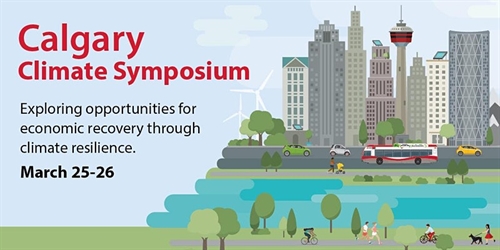Elevate your local knowledge
Sign up for the iNFOnews newsletter today!

Join us to learn about the CalgaryEats! Food Action Plan, followed by two presentations form the University of Calgary, Sustainability Studies, School of Architecture, Planning and Landscape. We will delve into lessons from COVID-19 and leveraging untapped resources can address climate-based food system vulnerabilities. Climate change is a clear and present danger to food security in cities around the world. As the COVID-19 pandemic demonstrated, food systems across Canada and the USA are vulnerable to disturbances impacting food supply and access. Additionally, COVID-19 highlighted the importance of regional food production and distribution links in strengthening resilience of the local food system to address food security concerns during a crisis; the need for which is possibly even more important for climate change. Calgary and the surrounding region have untapped resources that could strengthen the city’s resilience to climate-based impacts that will affect food insecurity. Citing examples across North America, this talk will highlight lessons illuminated by the COVID-19 pandemic and how leveraging local untapped resources can equally address food insecurity, climate change resilience, and economic recovery. Such untapped resources include regional regenerative agriculture, geothermal energy from orphan wells to heat greenhouses, and urban agriculture using technologies such as hydroponics. An Urban Indoor Hydroponics Network – Building a climate resilient local food production system in Calgary Climate projections present significant uncertainty for agriculture production, this uncertainty is only compounded by immediate shocks to our global food system like the COVID-19 pandemic. These uncertainties facing the existing food system demonstrate the need for resilient and diversified food production strategies. Indoor hydroponics applications, like those found in container farms, showcase an opportunity for increased local food production in locations where food production capacity is limited. While there may be a business case for deploying a network of indoor hydroponic units around the city, this talk focuses on exploring an indoor hydroponics network through a community development and resilience lens.Presenters:Kristi Peters, B.A., M.E.M. Food Systems Planner, The City of CalgaryAlexander Wilkinson, PhD Candidate, University of Calgary, Sustainability Studies, School of Architecture, Planning and LandscapeTatenda Mambo, Postdoctoral Fellow, University of Calgary, Sustainability Studies, School of Architecture, Planning and LandscapeKristi Peters is a Food Systems Planner with The City of Calgary where she leads the implementation of the CalgaryEats! Food Action Plan. Through programs and partnerships, she works with City departments and a range of external stakeholders to identify barriers and optimize opportunities to create a more sustainable and resilient food system for Calgary. She currently sits on the Steering Committee of the national Food Communities Network. She is also a long time member of Food Secure Canada, and participates on global sustainability food networks like the C40 network and EAT.Her professional background is in both culinary and food systems research with over 15 years of experience focused on sustainable local food system research and community action. This work has been formative in building relationships with local/regional growers, producers and other food system actors to explore urban food system sustainability challenges within the Calgary context.Alex Wilkinson is a PhD Candidate in the School of Architecture, Planning and Landscape and a Research Analyst in the Sustainability Studies program. My academic background is a BSc in Applied and Environmental Geology, and an MSc in Sustainable Energy Development. My PhD research explores social ecological systems and systems thinking, sustainable food systems, responding to change, and resilience, with a specific interest on developing place-based strategies for responding to social ecological changes such as climate change and developing resilient food systems. Alex is also an instructor in the Sustainability Studies undergraduate certificate program.Tatenda Mambo is a postdoc in the School of Architecture, Planning and Landscape and a Research Analyst in the Sustainability Studies program. His completed his Ph.D at the University of Calgary investigation urban food insecurity, gender and HIV/AIDS in Lilongwe, Malawi. As part of his postdoc, Mambo’s research explores sustainable food systems, regenerative agriculture, and food security.About the Calgary Climate SymposiumThe Calgary Climate Symposium is an opportunity to open up the conversation about climate change – how and why to talk about it, how it affects Calgarians and what we can do about it together.Connect with community leaders, entrepreneurs, prominent industry experts and City staff for a series of unique (and free!) learning opportunities at the Calgary Climate Symposium, March 25 to 26, 2021, with partner satellite events from March 20 through 27.The Calgary Climate Symposium will explore:• how Calgary can prepare for the impacts of a changing climate, • how Calgary can leverage economic recovery from the COVID-19 pandemic to unlock new business opportunities and strengthen climate change resilience,• innovative solutions to climate change,• and much more!View the complete symposium schedule and register for other sessions at Calgary.ca/ClimateSymposium.